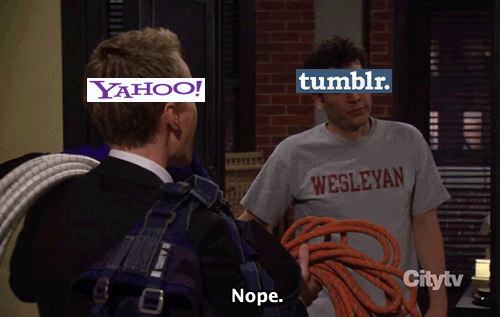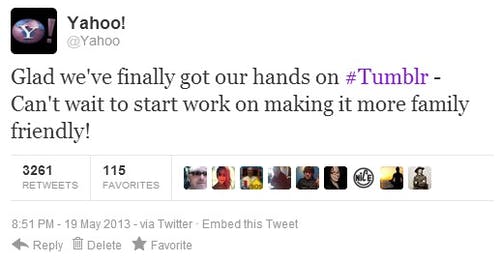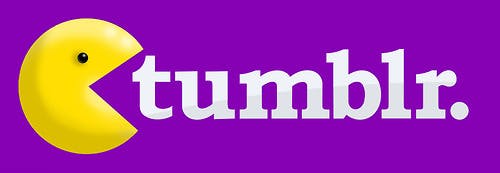It’s officially official: Yahoo/Tumblr is canon.
The web conglomerate carried off a $1.1 billion cash purchase of the hip young social media platform in one of the most unexpected couplings to come from the recent scramble of old-school web platforms to remain relevant by buying the next big thing.
Tumblr users appear to have utterly rejected the idea of the buyout, spending the weekend cooking up worst-case scenarios and vowing account deletions and a mass user exodus should the sale go through.

Photo via oestranhomundodek
But however unwilling Tumblrites might be, they still have much to teach Yahoo about the ways and means of Internet culture. If Yahoo is paying attention—and to be fair, the press release does state, “we promise not to screw it up”—it could carry these lessons far into the future.
As long as it doesn’t pull another Flickr or Delicious.
Here are the ten things Tumblr can teach Yahoo about the Internet.
1) You’re only as good as your community.

Photo via thirdfloorblog
This is a lesson Yahoo notably failed to learn with Flickr and Delicious. Forget branding your community; your community is now your brand, and with the Tumblr community, attempting to superimpose a brand will only backfire. Tumblr communities are largely self-branded and independent, devoid of any strong connection to Tumblr staff. Their loyalty is to the collective image of Tumblr users as a group, not to Tumblr CEO David Karp, to Storyboard, or to any future Yahoo employees. With Flickr, Yahoo largely ignored the community. With Tumblr, it does so at its peril.
2) Your community is only as good as the platform it’s on.
Lurking deep in the bowels of Yahoo is Yahoo Groups, formerly eGroups, née OneList. A holdover from the great mailing lists of the ‘90s, Yahoo Groups have quietly thrived for over a decade, with relatively slight attention from Yahoo. Last year, the Huffington Post called Yahoo’s mailing lists “a goldmine Yahoo! never mined and something that could have defined who they are today.”
With its disorganized methods of communication, constant chatter, and overwhelming emphasis on images rather than words, Tumblr is the antithesis of Yahoo Groups, except for the most important overlap: both communities have identities tied to the platforms they use. Just as many Tumblr users wouldn’t be caught dead on Facebook or Reddit, many Yahoo Groups take pride in sticking to their old-school methods of communication. If Yahoo is to encompass such disparate communities and encourage them all to thrive, it needs to acknowledge that the parts are greater than the whole: Tumblr users are never going to embrace being a part of the Yahoo network if it means erasing their identities as members of Tumblr.
3) Your platform is only as good as its functionality.
When Yahoo’s intention to “sunset” popular bookmarking website Delicious leaked to the Internet in 2010, Delicious alternative and self-professed “antisocial network” Pinboard saw a tenfold traffic increase. The reason for the surge? Pinboard was the closest site in functionality to the extant features Delicious offered.
When YouTube’s founders, Chad Hurley and Steve Chen, purchased Delicious and took over the reigns from Yahoo, they unveiled a site with broken functionality and inexplicable new features, notably “Stacks,” that sent even more users into the waiting arms of Pinboard. Delicious, still floundering nearly 2 years later to recover from the disastrous buyout, eventually got rid of the stacks after negative feedback from users.
Like Delicious, Tumblr is a site that offers a very specific thing. Unlike Delicious, however, there aren’t really any sites that can act as clones in the event of a catastrophic event. Posterous and Vox have closed, Instagram lacks enhanced web features, and the Tumblr generation has rejected LiveJournal’s text-based blogging community. If Yahoo changes any part of Tumblr’s core functionality, it could easily take all of Tumblr’s userbase with it. And not everyone will want to stick around to adjust to New Tumblr–not even if they don’t have anywhere else to go.
4) The only sure thing is impermanence.
Tumblr fame is as ephemeral as a post on a popular Tumblr tag, or a reblog in the middle of a Tumblr that updates hundreds of times a day. Tumblr users, for the most part, fixate on popular posts rather than popular users–and often the posts themselves will disappear, as the original poster gets sick of how popular the post is. Names and Tumblr urls likewise come and go.
There’s no room for a universal login or a Google-esque real life validation system on Tumblr. In the age of using Facebook and Twitter to connect to every site on the planet, there’s still something to be said about having a standalone account, untethered to every other interlinked account you own, one that exists solely at your whim.
Anonymity, changing identities, posts that vanish at the crux of their popularity–these things characterize Tumblr, as well as the paradox of universality that unites every member of Tumblr. Yahoo prides itself on its ability to collect aggregate data from its userbase. But if it applies such info-gathering techniques to Tumblr, it must do so in the spirit of fostering Tumblr’s unique commitment to its own lack of individuality. It is a hard-won camouflage, a refuge away from the increased policing of identity elsewhere around the Internet; and to kill it would kill the spirit of Tumblr–as well as, perhaps, the spirit of remix culture itself.
5) The Internet is for porn.

This fake tweet has been circulating Tumblr all weekend, prompting an endless outcry of “Yahoo, No!” from gullible Tumblr users; via glassph0enix
While BusinessWeek is questioning what Yahoo will do with all the porn, the road to hell gets ever wider for Tumblr users. In many ways, Tumblr is a (mostly) more civilized leg of the 4chan army, with its endless capacity for unmoderated content turning up the dregs of humanity along with the most compelling bursts of creativity, all in a kind of unwashed cultural melee.
In a Yahoo ad-funded Tumblr universe, specific content filters will almost certainly need to exist to weed out Tumblr’s truly horrific (and illegal) activities. But let’s face it: half of Tumblr’s appeal is the energy it generates because of its uncharted wilds-of-the-Internet feeling. And if that means that along with the wonderful Tumblr memes, the thought provoking critical Tumblrs, and the endless array of stunning art and photo blogs, we also get endless amounts of NC-17 fanart and a constant barrage of porn GIFs, then surely it’s not the world’s worst tradeoff.
Judging from Yahoo CEO Marissa Mayer’s thoughts on Tumblr’s NSFW content, she’s embraced the idea that strolling through Tumblr is a bit like walking down 42nd St. in a pre-Giuiliani Manhattan: Sure, there are hookers on every corner, but there’s jazz in the air.
6) GIF with the program
If you ever doubted that the evolution of the Internet is away from text and toward a more immersive image-based Internet, then Tumblr’s reaction GIF culture shows you just how far we’ve come. For example, why expend 5,000 words of meta describing your reaction to Tumblr buying Yahoo when you can just do this?

Photo via shippingharry
7) Moderation is out, curation is in
“Today there are millions of people making stuff and putting it into the world: that’s become part of our identity and it shouldn’t be limited to people who fancy themselves writers, or who are particularly witty or talented: curation is a new, more accessible way to express yourself.” – David Karp
Tumblr’s system of reblogging merges social media potential for quality crowdsourcing with the increasingly necessary art of creative curation. As more people begin to create more things, and sharing creative works digitally becomes easier than ever, Tumblr’s baseline appeal involves its ease of putting awesome things on your dash. You don’t have to track down every artist or artistic community to find cool things–just follow a few people with good taste and let them bring the awesome to you.
While Tumblr does let users moderate submissions and create moderated communities, the reblog system does the work of “moderating” Tumblr’s dashboard content naturally. The cream rises to the top. Along with the endless amount of users typing the words, “why doesn’t this have more notes?” into the ether.
8) Internet culture is Remix culture.

Photo via jordanschacter
Creative Commons. Meme culture. Recursive literature. Collective creativity. Convergence. Audience-driven media. Whatever the buzzwords your experience of Internet culture may be filled with, the bottom line is that individual ownership and authorship have never been as incidental to the human race as they are on the Internet. The billions of creative works being passed around, remixed, sampled, GIFed, fanworked, riffed, modified, and ripped off somewhere on the web at this very second attest to the fact that our most progressive definition of copyright has yet to catch up with the bottomless capacity of netizens to take that awesome thing you made and make something even more awesome out of it. Tumblr feels like the future of the Internet in part because it taps directly into the hivemind of remix culture. If David Karp didn’t exist, someone else would have had to invent a social media platform that makes passing memefied creativity around the web as easy as tossing a football around your backyard.
9) No relationship at all is better than a bad relationship.
For all Yahoo’s promises of staying out of Tumblr’s way, the secret may be even simpler: practice indifference. After all, it worked for Tumblr. Despite ongoing problems with a lack of transparency, slow site updates, and nearly silent staff layoffs, Tumblr’s popularity nearly quadrupled in the last 18 months, from 25 million accounts in 2011 to over 100 million as of this month. Given the aforementioned emphasis on Tumblr’s community, it’s easy to see that Tumblr itself has benefited neatly from its hands-off approach. Most Tumblr users only know David Karp because his head frequently shows up in Tumblr-related reaction GIFs.
And sure, they’re interacting more with Karp’s memefied image than with The Man himself: but isn’t that the sure sign of an Internet god?
10) Don’t fix what isn’t broken.

Photo by huygenz
Yahoo’s track record when it comes to buying, then discontinuing, various services is long and painful.
But if it’s learned anything from Flickr and Delicious, it’s to leave well enough alone. In the case of Tumblr, “well enough” has been enough to grow the site at a phenomenal rate.
And “well enough” may come to be Yahoo’s saving grace as it faces down a Tumblr userbase that’s vocally, desperately hoping that nothing about their beloved Internet home will change.
Not even, possibly, for the better.
Photo via zen-kaze/Tumblr


